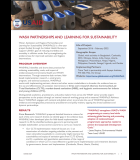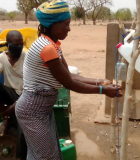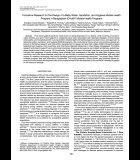NGO Health Service Delivery Project (NHSDP)
NHSDP is the United States Agency for International Development (USAID)/Bangladesh’s largest health initiative; this flagship project is the latest in a series of programs going back to at least 1998 that have sought to improve the ability of local NGOs to provide basic health services to the poor. NHSDP was designed in 2012, when USAID was implementing significant procurement reforms and emphasizing the need to work more directly with local organizations. In 2013, USAID received gift funds from the United Kingdom’s Department for International Development (DFID) to co-fund NHSDP, which expanded the scope considerably. The DFID supplementary fund has supported the current NHSDP activities and strengthened its focus on family planning (FP) and maternal health outcomes, with a specific focus on improved service delivery for the urban poor.
Activity Description
USAID designed NHSDP to complement the Government of Bangladesh’s (GoB) efforts to offer quality health, nutrition and population services at low or no cost, while supporting the sustainability of local service-delivery organizations. NHSDP was designed to strengthen local ownership of service delivery through institutional strengthening interventions targeted at the network NGOs. Led by Pathfinder International under a USAID contract and implemented through a coalition of national and international partners, a primary health care Essential Services Package (ESP) is being provided to a nationwide “Smiling Sun” or Surjer Hashi (SH) network of 25 local NGOs. The 25 partner NGOs oversee operations of 388 static clinics, 10,186 satellite clinics, 7,321 community service providers (CSPs) and 777 service promoters throughout Bangladesh.
The contract’s goal is to decrease fertility, child morbidity and maternal mortality through three intermediate results (IRs). The contract mandated that the network recover 40 percent of its operational costs, while simultaneously ensuring that a minimum of 40 percent of services are delivered to the poor. In line with USAID’s global procurement reforms, the contractor was to prepare at least two sub-grantee NGOs to transition to direct USAID grantees.
Expected Outcomes
• Improved access, especially for the poor, to ESP through a cohesive network of NGO clinics, satellite clinics, and CSPs
• Strengthened partnerships and coordination with GOB health authorities and other USAID-supported projects
• Enhanced sustainability of ESP delivery maximized through innovative finance structures
• Healthy behaviors and care seeking practices improved through behavior change communications and knowledge management
• Communities are actively engaged in promotion of healthy behaviors and care seeking practices
• Institutional capacity of local NGO partners strengthened
• One to two local NGO partners transitioned to direct USAID grantees
Actual Outcomes
• NHSDP NGOs are also achieving the target of 40 percent serving the poor
• Prescribing pregnant and lactating women 30IFA (85 percent), vitamin A supplementation for children under 5 through U.S. Government-supported programs





